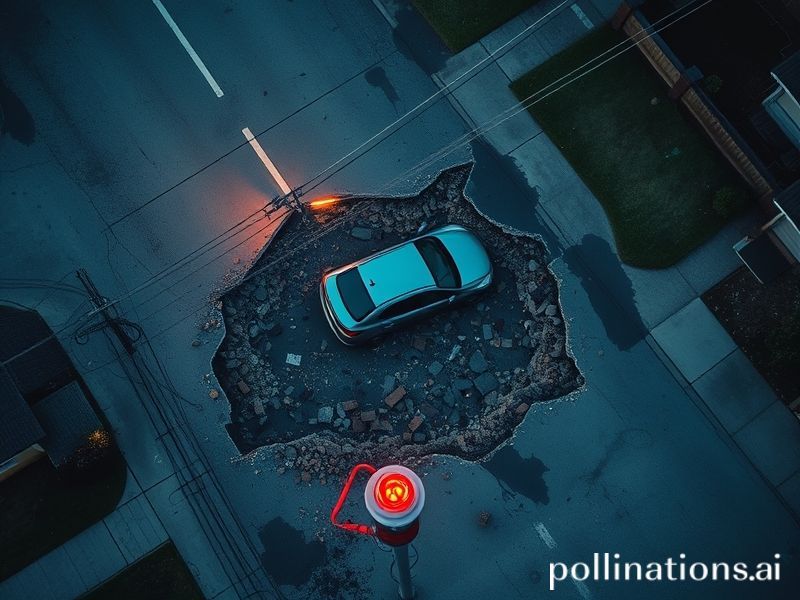Planet Throws Three-Punch Combo Before Lunch: Today’s Global Earthquake Round-Up
The Earth Moved—Did Anyone Notice?
A Global Dispatch on Today’s Seismological Mood Swings
By the time you poured your second cup of coffee, the planet had already thrown three separate tantrums before lunch. A 6.2-magnitude hiccup off the southern coast of Peru jostled Lima’s bankers awake at 4:17 a.m. local time, toppling a few colonial balconies and reminding the financial district that Mother Nature still outranks the central bank. Meanwhile, the Mediterranean tried its hand at plate-tectonic Pilates: a shallow 5.4 rattled the Greek-Turkish border region, gifting homeowners in Izmir yet another excuse to blame “shoddy contractors” while simultaneously providing Athenians with fresh material for smug earthquake-preparedness memes. Over in the Pacific, Japan’s Meteorological Agency issued its now-customary “there is no tsunami threat” tweet at 6:03 a.m.—a sentence so reflexively calm it could double as the nation’s new national anthem.
Earthquakes, of course, are the original equal-opportunity destroyer: no visa requirements, no frequent-flier miles, and absolutely no respect for GDP. They arrive, shake the snow globe, and leave governments performing the familiar choreography of press conferences, casualty updates, and promises to “build back better”—a phrase that now sounds less like policy and more like an annual gym membership renewal nobody believes in. Still, today’s trio offers a handy geopolitical sampler platter. Peru’s copper mines—responsible for roughly 12 % of the global red-metal supply—briefly suspended operations, nudging futures traders in London to mutter “risk premium” into their sixth espresso. Across the Aegean, Greece and Turkey paused their traditional airspace bickering to exchange emergency SMS codes, proving that nothing unites old foes like the prospect of shared rubble. And Japan? The Nikkei barely flinched; after Fukushima, a 5.8 barely qualifies as market volatility, let alone front-page news.
Zoom out and the picture darkens. The UN Office for Disaster Risk Reduction estimates that annual global losses from quakes now top $300 billion—roughly the GDP of Finland, converted into splinters and concrete dust. Yet only 4 % of international humanitarian aid is pre-earmarked for preparedness; the rest arrives post-catastrophe, like an ambulance that shows up with sirens blaring after the patient has already bled out on the pavement. Donors prefer their disasters televised, their grief commodifiable. A slow-motion seismic creep along the Himalayas may threaten 70 million people, but without dramatic footage it competes for airtime with a celebrity divorce.
Technology, our self-proclaimed savior, offers mixed consolation. Smartphone early-warning apps can now give Mexico City residents a luxurious 30-second head start to panic. Japan’s bullet-train algorithm can slam the brakes at the first P-wave tremor, saving lives and schedules alike. Yet for every algorithmic hero, there’s a bureaucratic villain: Istanbul’s long-promised urban-transformation law—designed to bulldoze 1.5 million death-trap buildings—remains stuck in parliament like a tectonic plate that refuses to budge. The fault, dear Brutus, is not in our stars but in our zoning commissions.
Human nature, ever the comic relief, responds with entrepreneurial verve. Within hours of today’s Peruvian shake, local influencers were already filming “What’s in my emergency backpack?” tutorials, sponsored by a brand of quinoa energy bars. In California—quiet for now, but statistically overdue—start-ups sell $299 “seismo-boxes” containing artisanal water, a solar charger, and a card deck titled “52 Ways to Ignore Imminent Doom.” Nothing says Silicon Valley quite like gamifying mortality.
And so the planet keeps shrugging, indifferent to our dashboards and debt ceilings. Each quake is a reminder that nationality is just a flag stuck in moving soil, that passports won’t protect you when the ground decides to rewrite its borders. We insure, we reinsure, we tweet condolences with flag emojis—then scroll on, praying the next one hits somewhere else, preferably after market close.
The earth will move again, probably tomorrow, possibly beneath you. Until then, enjoy the illusion of stillness; it’s the only tectonic plate we can’t measure.







